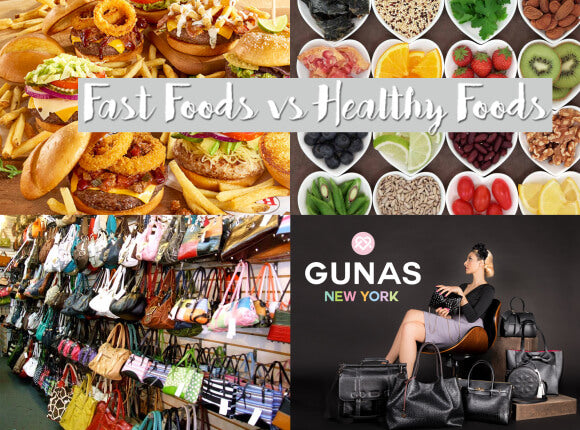The world is finally opening up their senses and closets to welcome the booming industry of vegan fashion with open arms. That means no silk, no fur, no leather, no down, no animal derived glues/adhesives. We at GUNAS couldn’t be happier about this shift in the winds. We’ve been advocating this desire for nearly a decade now and have been established as America’s first all vegan and ethical Handbag label. Having explored production in the US, China, India, Mexico, Italy and South Korea, we have spanned across the globe researching and forming an opinion on the best manufacturing processes and conditions.
We’ve heard of several terms being talked about in the fashion industry such as Vegan Fashion, Ethical Fashion, Slow fashion, Fair trade, Conscious Consumerism, Eco- Fashion, Green Fashion. How do you differentiate between fast fashion and high quality fashion? Simple put, just like you’d differentiate between Fast Foods and Chef prepared culinary foods. So what makes a brand vegan and ethical? Sure, using non leather materials is a start. But how the products are manufactured and sold are of equal importance.

I, Sugandh Agrawal, Founder & Designer for Gunas NY, started my first collection in the heart of New York’s fashion district. My moto was to make ethical, animal-friendly designer and luxury fashion available to the masses. While New York has amazing artisans, I couldn’t make a product that was affordable. So, back in 2010, I did 2 rounds of production in China. I personally visited each factory and was mortified by the working conditions in Chinese factories. They really do paint a beautiful picture for the rest of the world, till you actually go and see them in person. I openly do not support “Made in China” because I don’t believe in fueling an oppressive society and nation. Just like I don’t want my products to be sold on Amazon, who is killing several small businesses and promoting an unethical consumer behavior due to their unreasonable return policies.
So after the huge disappointment and awakening I experienced in China, I decided to take manufacturing under my control and set up shop in India. I converted my parents garage into a studio and helped train local artisans to make handbags. However, after getting pregnant with my daughter I decided to shift base back to New York to continue promoting the brand and my message. In 2013 I discovered skilled bag makers in Seoul, South Korea. This was a woman owned operation that employed 5 families jointly to handle various aspects of the handbag making process. I had found the perfect home for manufacturing Gunas. What a roller coaster ride this has been! And I’ve loved every bit of it.
I’ve found that a brand cannot claim it’s ethics if it’s pricing their products cheaply. Affordable for “you” means someone else is paying for it in the form of poor wages and low quality of living. Veganism means non-violence; ahimsa, as the yogis call it. So if you desire to be kind to animals, let that desire extend to also the people making your products. That’s what ethical fashion stands for. Fair wages and good working environments for workers. So while you start buying products that are not made using animal by products, extend your knowledge beyond that and understand that cheap vegan fashion can never be ethical vegan fashion. There is a clear distinction there and you as a consumer should be aware of the impact your choices have.
As human beings we are all looking for instant gratification, due to the complicated world we live in today. We are slowly forgetting the pleasures of saving up for something we really desire, like the excitement a child experiences when they get something they’ve longed for and earned it in a way. Everything is now fast paced and hence it has lost it’s appeal in providing that gratification, the thing you were running after in the first place. Buy fewer things that are well made. Know who made your fashion and support smaller, exclusive brands that are willing to provide transparency on their processes. Yes, it may cost more but when you buy expensive things, you’ll use them more carefully. You will not discard them, but repair them. You will understand the difference between shopping because you “need” something versus because you “want” something.
I hope you enjoyed this little piece of shopping advice and insight into my thoughts on veganism in fashion. Just as fast foods may not be the best for your health, fast vegan fashion is not the best for closet. Literally “take the time to smell the roses”. Shop for ingredients, cook your own meals, buy fewer things, support small businesses, know who made your fashion. Just like they used to in olden days
Stay connected! (Not just digitally)
Love,
Sugandh


